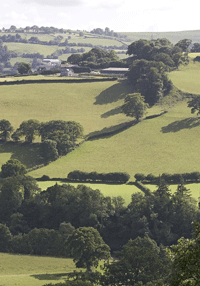Farmers to face new wildlife targets?

Pressure is likely to increase on farmers to reverse a “seemingly inexorable” decline in wildlife, suggests a report.
More effort is needed to reverse the decline in numbers of many species and the continuing loss of valuable wildlife habitats, warns the study.
The document, Making Space for Nature, was published by DEFRA on Friday (24 September).
The report calls for a step-change in the government’s approach to wildlife conservation.
Large-scale habitat restoration and recreation is needed for the benefit of both people and wildlife, it recommends.
“Private landowners, land managers and farmers have a crucial role to play in delivering a more coherent and resilient wildlife network.”
The independent review of England’s wildlife sites and ecological networks was written by zoologist John Lawton.
“There is compelling evidence that England’s collection of wildlife sites are generally too small and too isolated,” he said.
This had led to declines in many of England’s characteristic species, warned Professor Lawton.
The situation was likely to worsen with climate change, he added.
DEFRA secretary Caroline Spelman said addressing the loss of biodiversity could not be achieved by the government alone.
“Everyone from farmers, wildlife groups, landowners and individuals can play a role in helping to create, manage and improve these areas.”
The government was looking to set new targets to tackle the decline in the natural environment, said Mrs Spelman.
“We will follow this through with the first Natural Environment White Paper for 20 years in the UK,” she added.
Farm leaders said they agreed more must be done to protect wildlife but warned that those already doing so must not be penalised.
Only land managers could provide the sort of countryside everyone wanted, said William Worsley, president of the Country Land and Business Association.
“They are the ones who can effectively manage the hay meadows, ponds and hedgerows on which wildlife depends.
Mr Worsley said he was pleased the report endorsed the need for retaining environmental grants.
“Landowners could do even more if they were allowed to receive other funding only currently available to conservation groups,” he said.
Massive cuts to public spending made it essential for the government to ensure farmers and land managers were on board.
“Without them, England’s wildlife network will not be strengthened because nobody will be able to look after it or afford to pay for it.”
Conservation groups agreed with the report’s recommendation that farm environment schemes should be retained.
Funding wildlife schemes was prudent even in times of austerity, said RSPB senior policy officer Alice Hardiman.
“This review helps to identify areas which could form the backbone of the forthcoming Natural Environment White Paper,” she said.
“In particular, the recommendation to retain England’s most successful wildlife-friendly farming scheme is especially welcome.”
